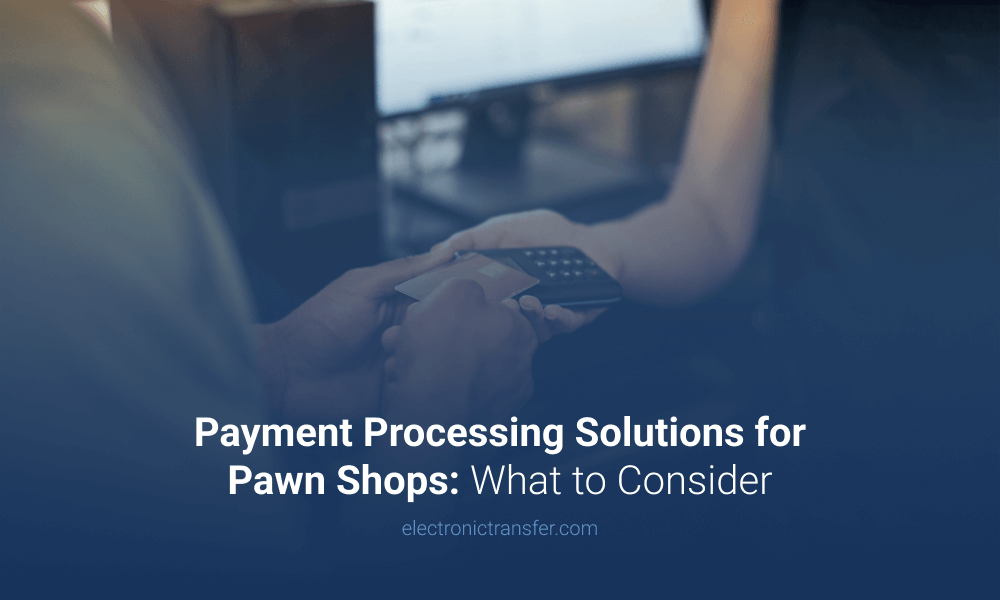Payment Processing Solutions for Pawn Shops: What to Consider

Pawn shops have been around for centuries, offering a unique service to people who need quick cash. These businesses buy items, offer loans using items as collateral, and sell a wide range of goods.
However, in today’s tech-dependent world, cash is quickly becoming outdated, and pawn shops need to keep up with modern payment methods.
In this article, we’ll take a look at pawn shops and how payment processing can help shop owners look towards the future.
How Do Pawn Shops Work?
Let’s take a quick look at how pawn shops operate and where payment processing fits in:
A customer brings in a valuable item (e.g., jewelry, electronics).
- The pawnbroker assesses the item and offers a small loan or purchase price.
- For loans:
- The pawnbroker uses a Point-of-Sale (POS) system to record the transaction details, including item description, loan amount, and terms.
- The customer receives cash, no electronic payment processing involved.
- A pawn ticket is issued, detailing the loan terms.
- When repaying the loan:
- Customers can pay in cash or use electronic methods (credit/debit cards).
- For electronic payments, a payment processor handles the transaction.
- If the loan isn’t repaid, the shop can sell the item:
- Various purchasing methods by the customers can be used.
- For outright purchases from customers:
- The transaction is processed through the POS system.
- Payment is typically in cash, though checks or transfers may be accepted.
- When selling goods:
- Clients can use various payment methods.
- The payment processor handles electronic transactions.
- Cash transactions are recorded in the POS system for inventory management.
Challenges in Payment Processing for Pawn Shops
Although payment processing is involved every step of the way, pawn shops face some unique challenges when it comes to handling payments:
- High-risk classification: Banks and payment processors might view pawn shops as “high-risk” businesses. This can make it harder to get approved for payment services.
- Cash-heavy transactions: Pawn shops deal with a lot of cash, which can be risky and time-consuming to manage.
- Compliance with regulations: There are strict rules about how pawn shops operate, including how they handle payments and report transactions.
- Need for versatile payment options: Customers today want to pay and be paid in different ways, from cash to credit cards to mobile payments.
Payment Solutions for Pawn Shops
High-risk merchant accounts, offered by specialized providers like Electronic Transfer Inc., cater to businesses deemed high-risk, including pawn shops. So, the first step in finding stable solutions for your pawn shop business is to find the right payment processor.
Factors to Consider When Choosing a Payment Processor
When selecting a payment processor for your pawn shop, keep these factors in mind:
- Fees and pricing structure: Look at all the costs involved, including setup fees, monthly fees, transaction fees, and any equipment costs.
- Contract terms and conditions: Read the fine print carefully. Look out for long-term commitments or early termination fees.
- Customer support and technical assistance: Make sure the provider offers reliable support when you need it.
- Integration capabilities: The payment solution should work well with your existing systems and software.
- Scalability: Choose a solution that can grow with your business.
Payment Processing Features to Look For
Pawn shops need payment processing solutions with specific features, such as:
- Multi-channel payment acceptance: The ability to accept various payment types, including cash, credit cards, debit cards, and even mobile payments.
- Integration with POS systems: A payment solution that works with the shop’s existing POS system can save time and reduce errors.
- Fraud prevention and security measures: Strong security features that protect against fraud and data breaches are crucial.
- Compliance with industry regulations: The payment system should help the pawn shop stay compliant with local and federal regulations.
- Reporting and analytics capabilities: Detailed reports can help pawn shop owners track their business’s performance and spot trends.
Best Practices
To get the most out of your payment processing solution:
- Understand exactly what your pawn shop needs before shopping for a solution.
- Don’t settle for the first option you find. Get quotes and proposals from several providers.
- If possible, test the solution on a small scale before fully committing.
- Make sure your employees know how to use the new solutions correctly.
- Keep an eye on your payment processes and look for ways to improve them over time.
How Electronic Transfer Inc. Can Help Your Pawn Shop
With more than 30 years of experience, Electronic Transfer Inc. (ETI) stands out as a top provider for high-risk businesses like pawn shops. Here’s why:
- We understand what makes your business “high-risk” and can help you deal with these challenges.
- Our payment solutions for pawn shops have strong safeguards that stop unauthorized transactions.
- If a customer disputes a charge, our system helps you manage it efficiently.
- We ensure your business follows all the necessary rules and regulations.
- Our specialized team is always ready to assist our high-risk customers.
- ETI’s payment processing can easily connect with the tools you already use.
- We use top-notch security to protect your customers’ information.
Wrap Up
The right payment processing solutions can make a big difference in the efficiency and success of your pawn shop. Remember to consider factors like fees, integration capabilities, and customer support when making your decision. And don’t forget to stay up-to-date with the latest payment technologies to keep your pawn shop competitive in the years to come.


